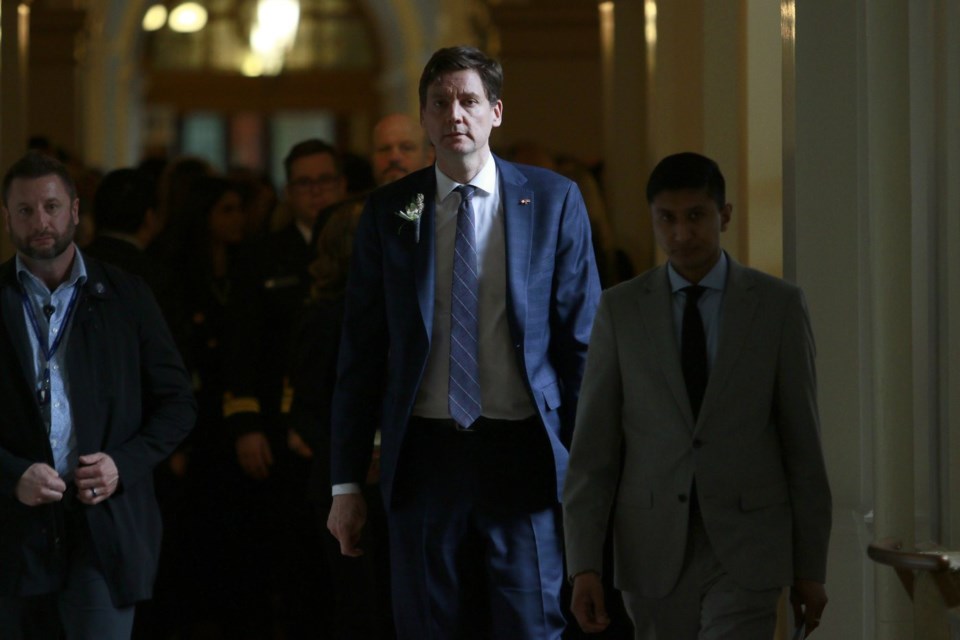British Columbia's government was fast-tracking the end of its consumer carbon tax on Monday, in time for the lifting of the federal equivalent the next day, with Premier David Eby saying consumers should expect immediate price relief at gas pumps.
The NDP's bill amending B.C.'s Carbon Tax Act to set the consumer rate at $0 passed its first reading on Monday — BC Green Rob Botterell was the lone dissenting vote — and it was poised to complete its journey into law by midnight under so-called "accelerated consideration."
However, the Opposition Conservatives and BC Greens expressed concerns about the financial shortfall that scrapping the tax leaves in the budget, along with the end of the climate action tax credit that had been distributed since 2008, with a focus on B.C.'s lowest income households.
"Even with the elimination of the carbon rebate, there is still a hole of $1.5 billion in the provincial budget," Botterell said during debate over the second reading of the bill.
"Previously, the deficit was projected at $10.9 billion. Can we now assume that it will be $12.5 billion, or can we expect cuts to core services that people rely on?"
A joint statement issued by Eby's office and the ministries of energy and finance said cancelling the tax and credit would have an estimated impact of $1.99 billion in the coming fiscal year.
The premier told a subsequent news conference that consumers should expect a gas price drop of about 17 cents per litre on Tuesday — assuming the bill passed — adding that B.C. has legislation to ensure the province's utilities commission has the authority to uncover price gouging.
"So just a little heads-up to the oil and gas (companies), now is not the moment. British Columbians need to see that tax reduction show up at the pump," he said.
However, Botterell said relief at the pump would be temporary and "illusory" as rising fuel costs for consumers are driven primarily by fuel company markups.
Prices in Metro Vancouver have recently been around $1.90 a litre, down to about $1.50 in other parts of the province.
B.C. residents were facing "huge affordability pressures," Eby said, and while he had "fought" for the carbon tax in the past, the policy became a "toxic" issue due to concerted campaigns by the B.C. and federal Conservative parties.
"The carbon tax played an important role here in British Columbia for many years, assisting us in reducing our emissions while our economy continued to grow. It was supported by parties from many different backgrounds," he said.
"However, the tax has become divisive, and at a time like this, British Columbians and Canadians need to be pulling together," the premier said, pointing to the tariffs and threats coming from U.S. President Donald Trump.
Speaker Raj Chouhan ruled the bill was sufficiently urgent and limited in scope to meet the test for accelerated consideration in one day. NDP house leader Mike Farnworth had called the bill's passage a "matter of confidence" for the government.
But Opposition finance critic Peter Milobar had said the government could have dealt with the bill sooner by recalling the legislature, and instead it waited until the "11th hour" before the lifting of the federal carbon tax backstop.
He said the government's approach has been "ham-fisted," unfairly cutting off discussion.
"We are essentially left to spend a couple of hours trying to quickly cobble together a cognizant response to something that has been in the public conversation for quite some time," Milobar said in the legislature.
BC Green Leader Jeremy Valeriote, meanwhile, said his party couldn't support passing the bill in a single day.
He said members of the legislature "need time to seek answers from government" about how it intends to resolve issues including the budget shortfall and end of the climate tax rebate that B.C. residents had come to expect on a quarterly basis.
Eby told the news conference the bill would pass with his government's one-seat majority.
"My understanding was that the Conservatives also thought the carbon tax should go, but if they want to vote to keep the carbon tax and go to an election, well, that says a lot about where their priorities are, I think," he said.
If by some "bizarre happenstance" the bill did not pass, the premier said the New Democrats would make the case to B.C. residents in an election that they're standing up to Trump while taking action to improve affordability and grow the economy.
Eby said he understood the anxiety people felt when they saw governments around the world abandoning emissions reduction targets, and B.C. would continue to "fight hard" against climate change.
He said the province would continue to ensure big industrial emitters pay through the output-based carbon-pricing system.
Opposition Leader John Rustad asked Eby in the legislature if he would commit to removing the industrial levy too, as he claimed credit for his party for the consumer tax's demise.
Rustad said Eby "capitulated on his strongly held personal beliefs due to political pressure" from the Opposition. "This is an amazing flip-flop worthy of an Oscar, but B.C. still has a punishing industrial carbon tax," Rustad said.
Eby said the carbon tax was introduced by the former BC Liberals and Rustad had voted in favour of the initiative multiple times as a member of that government.
"He wants to let big polluters off the hook because he doesn't think climate change is real," the premier said of Rustad.
This report by The Canadian Press was first published March 31, 2025.
Brenna Owen, The Canadian Press



